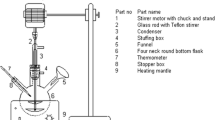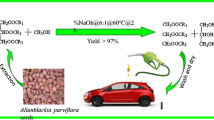Abstract
This article reports the deliverables of the experimental study on the production of a completely renewable biofuel from Manilkara zapota fruit and seed oil. It was attempted to synthesis ethyl ester from Manilkara zapota seed oil using bioethanol synthesized from decayed Manilkara zapota fruit. Bioethanol was produced through fermentation of decayed Manilkara zapota fruit, waste skin, and pulp with Saccharomyces cerevisiae and then distilled at 72°C. The bioethanol yield was noted as 10.45% (v/w). The 95.09% pure bioethanol and 4.9% water molecules were present in the distilled sample. Mechanically extracted raw Manilkara zapota seed oil was used for ethyl ester conversion. The molar ratio of bioethanol to oil, the quantity of KOH, and process temperature were investigated for the maximum yield of Manilkara zapota ethyl ester. A 9:1 molar ratio of bioethanol to oil, 1.5% (w/w) KOH, and 70°C process temperature were identified as enhanced ethanolysis process parameters. The maximum yield of ethyl ester was identified as 93.1%. Physicochemical characteristics of Manilkara zapota oil, bioethanol, and ethyl ester were measured as per the corresponding ASTM standards. It was found that both Manilkara Zapota ethyl ester and bioethanol synthesized from decayed Manilkara zapota fruit could be promising substitutes for fossil diesel and gasoline.









Similar content being viewed by others
References
Arslan R, Ulusoy Y (2018) Utilization of waste cooking oil as an alternative fuel for Turkey. Environ Sci Pollut Res 25:24520–24525. https://doi.org/10.1007/s11356-017-8899-3
Asli MS (2010) A study on some efficient parameters in batch fermentation of ethanol using Saccharomyces cerevisiae SC1 extract from fermented siahe sardasht pomace. Afr J Biotechnol 9(20):2906–2912. https://doi.org/10.5897/AJB2010.000-3120
Bolonio D, García-Martínez MJ, Ortega MF, Lapuerta M, Rodríguez-Fernandez J, Canoira L (2019) Fatty acid ethyl esters (FAEEs) obtained from grapeseed oil: A fully renewable biofuel. Renew Energy 132:278–283. https://doi.org/10.1016/j.renene.2018.08.010
Canilha L, Chandel AK, Dos Santos Milessi TS, Fernandes Antunes FA, da Costa Freitas WL, das Graças Almeida Felipe M, Silvio Silvério da Silva SS (2012) Bioconversion of sugarcane biomass into ethanol: an overview about composition, pretreatment methods, detoxification of hydrolysates, enzymatic saccharification, and ethanol fermentation. J Biomed Biotechnol:1–15
Charoenchai C, Fleet G, Henschke PA (1998) Effects of temperature, pH and sugar concentration on the growth rates and cell biomass of wine yeasts. Am J Enol Vitic 49:283–288
Fernandez CM, Ramos MJ, Perez A, Rodriguez JF (2010) Production of biodiesel from winery waste: extraction, refining and transesterification of grape seed oil. Bioresour Technol 101(18):7019–7024. https://doi.org/10.1016/j.biortech.2010.04.014
Ghosh A, Samadhiya K, Kashyap M, Anand V, Sangwan P, Bala K (2020) The use of response surface methodology for improving fatty acid methyl ester profile of Scenedesmus vacuolatus. Environ Sci Pollut Res 27:27457–27469. https://doi.org/10.1007/s11356-019-07115-5
Hanh HD, Dong NT, Okitsu K, Nishimura R, Maeda Y (2009) Biodiesel production through transesterification of triolein with various alcohols in an ultrasonic field. Renew Energy 34(3):766–768. https://doi.org/10.1016/j.renene.2008.04.007
Jahid M, Gupta A, Sharma DK (2018) Production of bioethanol from fruit wastes (banana, papaya, pineapple and mango peels) under milder conditions. J Bioprocess Biotech 8(3):327. https://doi.org/10.4172/2155-9821.1000327
Kafuku G, Mbarawa M (2010a) Alkaline catalyzed biodiesel production from Moringa oleifera oil with optimized production parameters. Appl Energy 87(8):2561–2565. https://doi.org/10.1016/j.apenergy.2010.02.026
Kafuku G, Mbarawa M (2010b) Biodiesel production from Croton megalocarpus oil and its process optimization. Fuel 89(9):2556–2560. https://doi.org/10.1016/j.fuel.2010.03.039
Karabas H (2013) Biodiesel production from crude acorn (Quercus frainetto L.) kernel oil: An optimisation process using the Taguchi method. Renew Energy 53:384–388. https://doi.org/10.1016/j.renene.2012.12.002
Kasavi C, Finore I, Lama L, Nicolaus B, Oliver SG, Oner ET, Kİrdar B (2012) Evaluation of industrial Saccharomyces cerevisiae strains for ethanol production from biomass. Biomass Bioenergy 45:230–238
Korkie LJ, BJH J, Viljoen-Bloom M (2002) Utilizing grape pomace for ethanol production. South African J Enol Vitic 23(1):31–36. https://doi.org/10.21548/23-1-2152
Liu R, Shen F (2008) Impacts of main factors on bioethanol fermentation from stalk juice of sweet sorghum by immobilized Saccharomyces cerevisiae (CICC 1308). Bioresour Technol 99:847–854
Madani M, Rezahasani R, Hoveida L, Ghojavand S, Enshaeieh M (2020) Two-step optimization process for grass hydrolysate application as biodiesel feedstock with novel quality characteristics. Environ Sci Pollut Res 27:39354–39364. https://doi.org/10.1007/s11356-020-09911-w
Mani Y, Devaraj T, Devaraj K, AbdurRawoof SA, Subramanian S (2020) Experimental investigation of biodiesel production from Madhuca longifolia seed through in situ transesterification and its kinetics and thermodynamic studies. Environ Sci Pollut Res 27:36450–36462. https://doi.org/10.1007/s11356-020-09626-y
MarelneCot M, Loret MO, Francois J (2007) Physiological behaviour of Saccharomyces cerevisiae in aerated fed-batch fermentation for high level production of bioethanol. FEMS Yeast Res 7:22–32
Melvin Jose DF, Edwin Raj R, Durga Prasad B, Robert Kennedy Z, Mohammed Ibrahim A (2011) A multi-variant approach to optimize process parameters for biodiesel extraction from rubber seed oil. Appl Energy 88(6):2056–2063. https://doi.org/10.1016/j.apenergy.2010.12.024
Mikulski D, Kłosowski G (2020) Microwave-assisted dilute acid pretreatment in bioethanol production from wheat and rye stillages. Biomass Bioenergy 136:105528. https://doi.org/10.1016/j.biombioe.2020.105528
Morshed M, Ferdous K, Khan MR, Mazumder MSI, Islam MA, Uddin Md T (2011) Rubber seed oil as a potential source for biodiesel production in Bangladesh. Fuel 90(10):2981–2986. https://doi.org/10.1016/j.fuel.2011.05.020
Nakpong P, Wootthikanokkhan S (2010) High free fatty acid coconut oil as a potential feedstock for biodiesel production in Thailand. Renew Energy 35(8):1682–1687. https://doi.org/10.1016/j.renene.2009.12.004
Nazli RI (2020) Evaluation of different sweet sorghum cultivars for bioethanol yield potential and bagasse combustion characteristics in a semiarid Mediterranean environment. Biomass Bioenergy 139:105624. https://doi.org/10.1016/j.biombioe.2020.105624
Neelakandan T, Usharani G (2009) Optimization and production of bioethanol from cashew apple juice using immobilized yeast cells by Saccharomyces cerevisiae. Am-Euras J Sci Res 4(2):85–88
Nigam PS, Singh A (2011) Production of liquid biofuels from renewable resources. Prog Energy Combust Sci 37:52–68
Phisalaphong M, Srirattana N, Tanthapanichakoon W (2006) Mathematical modeling to investigate temperature effect on kinetic parameters of ethanol fermentation. J Biochem Eng 28:36–43
Pramanik K, Rao DE (2005) Kinetic study on ethanol fermentation of grape waste using Saccharomyces cerevisiae yeast isolated from toddy. J Inst Eng 85:53–58
Rashid U, Anwar F, Moser BR, Ashraf S (2008) Production of sunflower oil methyl esters by optimized alkali-catalyzed methanolysis. Biomass Bioenergy 32(12):1202–1205. https://doi.org/10.1016/j.biombioe.2008.03.001
Sánchez BS, Mendow G, Levrand PG, Querini CA (2013) Optimization of biodiesel production process using sunflower oil and tetramethyl ammonium hydroxide as catalyst. Fuel 113:323–330. https://doi.org/10.1016/j.fuel.2013.05.085
Sargar N, Kolhe V, Nale M (2017) Experimental synthesis of ethanol from sugarcane juice molasses. Galore Int J Applied Sci Hum 1(1):48–52
Sathish Kumar R, Sureshkumar K (2016) Manilkara Zapota (L.) seed oil: a new third generation biodiesel resource. Waste Biomass Valor 7:1115–1121. https://doi.org/10.1007/s12649-016-9491-7
Sathish Kumar R, Sureshkumar K, Velraj R (2015) Optimization of biodiesel production from Manilkara zapota (L.) seed oil using Taguchi method. Fuel 140:90–96. https://doi.org/10.1016/j.fuel.2014.09.103
Sathish Kumar R, Sureshkumar K, Velraj R (2018) Combustion, performance and emission characteristics of an unmodified diesel engine fuelled with Manilkara zapota methyl ester and its diesel blends. Appl Therm Eng 139:196–202. https://doi.org/10.1016/j.applthermaleng.2018.04.107
Saydut A, Duz MZ, Kaya C, Kafadar AB, Hamamci C (2008) Transesterified sesame (Sesamum indicum L.) seed oil as a biodiesel fuel. Bioresour Technol 99(14):6656–6660. https://doi.org/10.1016/j.biortech.2007.11.063
Schinas P, Karavalakis G, Davaris C, Anastopoulos G, Karonis D, Zannikos F, Stournas S, Lois E (2009) Pumpkin (Cucurbita pepo L.) seed oil as an alternative feedstock for the production of biodiesel in Greece. Biomass Bioenergy 33(1):44–49. https://doi.org/10.1016/j.biombioe.2008.04.008
Sharma SK, Kalra KL, Kocher GS (2004) Fermentation of enzymatic hydrolysate of sunflower hulls for ethanol production and its scale up. Biomass Bioenergy 27:399–402. https://doi.org/10.1016/j.biombioe.2004.03.005
Sharma N, Kalra KL, Oberoi HS, Bansal S (2007) Optimization of fermentation parameters for production of ethanol from kinnow waste and banana peels by simultaneous saccharification and fermentation. Indian J Microbiol 47(4):310–316. https://doi.org/10.1007/s12088-007-0057-z
Supraja KV, Behera B, Paramasivan B (2020) Optimization of process variables on two-step microwave-assisted transesterification of waste cooking oil. Environ Sci Pollut Res 27:27244–27255. https://doi.org/10.1007/s11356-019-05384-8
Suresh T, Sivarajasekar N, Balasubramani K, Ahamad T, Alam M, Naushad M (2020) Process intensification and comparison of bioethanol production from food industry waste (potatoes) by ultrasonic assisted acid hydrolysis and enzymatic hydrolysis: statistical modelling and optimization. Biomass Bioenergy 142:105752. https://doi.org/10.1016/j.biombioe.2020.105752
Taherzadeh MJ, Karimi K (2007) Acid-based hydrolysis processes for ethanol from lignocellulosic materials: a review. Bioresources 2(3):472–499
Talebnia F, Karakashev D, Angelidaki I (2010) Production of bioethanol from wheat straw: An overview on pretreatment, hydrolysis and fermentation. Bioresour Technol 101(13):4744–4753. https://doi.org/10.1016/j.biortech.2009.11.080
Tiwari KL, Jadhav SK, Tiwari S (2010) The effects of temperature variation in the bioethanol production process. Bioprocess J 9(1):53–54. https://doi.org/10.12665/J91.Jadhav
Wu X, Leung DYC (2011) Optimization of biodiesel production from Camelina oil using orthogonal experiment. Appl Energy 88(11):3615–3624. https://doi.org/10.1016/j.apenergy.2011.04.041
Zabed H, Faruq G, Sahu JN, Azirun MS, Hashim R, Boyce AN (2014) Bioethanol production from fermentable sugar juice. Sci World J:1–11
Zaky AS, French CE, Tucker GA, Du C (2020) Improving the productivity of bioethanol production using marine yeast and seawater-based media. Biomass Bioenergy 139:105615. https://doi.org/10.1016/j.biombioe.2020.105615
Availability of data and materials
All data generated or analyzed during this study are included in this published article.
Author information
Authors and Affiliations
Contributions
SKR conceptualized, collected resources and investigated the experimental analysis, and validated the results. He was the major contributor in writing the manuscript. SK supervised the experimental investigation and validated the results. He has reviewed and edited the manuscript. All authors read and approved the final manuscript.
Corresponding author
Ethics declarations
Ethics approval and consent to participate
Not applicable
Consent for publication
Not applicable
Competing interests
The authors declare no competing interests.
Additional information
Responsible Editor: Ta Yeong Wu
Publisher’s note
Springer Nature remains neutral with regard to jurisdictional claims in published maps and institutional affiliations.
Rights and permissions
About this article
Cite this article
Rajamanickam, S.K., Kasinathan, S. Fatty acid ethyl ester from Manilkara zapota seed oil: a completely renewable biofuel for sustainable development. Environ Sci Pollut Res 28, 61790–61800 (2021). https://doi.org/10.1007/s11356-021-15078-9
Received:
Accepted:
Published:
Issue Date:
DOI: https://doi.org/10.1007/s11356-021-15078-9




